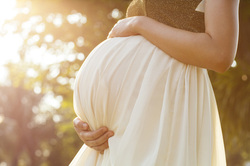 I wonder if you've noticed I've not been blogging recently? Well, there's a good reason - I've been on holiday, and it was wonderful. But now I'm back and raring to go. Today I want to draw your attention to a recent article about Reflexology as an aid to pregnancy and birth. This article was published by NHS Local in March 2011, so it's not new, but then, neither is the whole concept of Reflexology as a support during pregnancy and birth. There's not much scientific proof, but many Reflexologists and Midwives agree that Reflexology can be really beneficial. Here's what the article says ... "Unless you are especially ticklish, having your feet massaged or stroked is one of the most relaxing things that a women can enjoy. But a pilot study carried out at Walsall’s Manor Hospital has now revealed that such female pampering can also have a hugely beneficial effect when giving birth. There are plenty of 'old wives’ tales' about the best ways to induce birth, ranging from eating pineapple or curry to having sex. But a team from the Manor Hospital, made up of consultant obstetrician Sushma Sharma, midwives and reflexologists, has now found a seemingly more successful and scientific method after conducting a study into 100 overdue women. Some of the mums-to-be were offered free reflexology treatment on their feet during the final stages of their pregnancy, while others did without. And the results have shown that overall, the length of the first stage of labour was four hours shorter and the second stage - when the woman starts to push - was 21 minutes shorter, than of those women who had not received the reflexology treatment. Midwifery study at found reflexology reduced need for pain relief The pilot, which earned a runner-up prize in this year’s Royal College of Midwives Awards, also found that fewer women in the reflexology group needed strong pain relief during labour. Lin Gostling, matron for community midwifery and antenatal outpatients at the Manor Hospital, said: "There is lots of anecdotal evidence that reflexology works, but does it work or doesn’t it? "We used it in home deliveries a few years back, so we decided to do a small study involving 100 women from 40 weeks of pregnancy. "The purpose was to see if you can use reflexology to induce women because they are already overdue. "We decided on 40 weeks because NICE guidelines say you offer a membrane sweep at 40 weeks, and because a full-term pregnancy is from 37 weeks to 42." Women selected for labour inducing midwifery study The trial began in March last year, with the team’s midwives putting women forward before their membrane sweep to see if they could induce labour. Added Lin: "We set up a clinic for low risk women who were going past their due dates. "The reflexology was then carried out either two days before or two days after the membrane sweep." The study focused on several factors. Lin explained: "We were looking at the duration of the labour, analgesics used, delivery outcomes, and patient satisfaction. "We were surprised with the outcomes. We knew it was working, but four hours on average off the first stage of labour is quite a lot. "There was also a significantly lower number of women who had artificial ruptured membranes, which is good. "I am not a reflexologist, but there is something in the massaging and touching of feet that stimulates the uterus. Reflexology in itself is nothing new, but it’s something we are trying to offer in this particular area." Mothers-to-be at Walsall Manor pleased with results The patient satisfaction element of the study involved patient evaluation and postal questionnaire. "A lot of the women, including first time mums, said it worked, with comments such as ‘I was only in labour for four hours’, which is really good. "But even if they felt it didn’t work for them, a number of other women said it was still an enjoyable experience. "The fact it is showing success, even on a limited study, is encouraging. "However, it was a limited study and I think it needs further research. Demand is outstripping supply and I only have three reflexologists. "So, I am going to train further midwives as reflexologists so we can have it as a seven-day service." Sue Hartley, director of nursing and governance at Walsall Manor Hospital, said the midwifery team came up with the reflexology idea themselves and, with the right support, were able to carry out a research trial on their patients. She added: "The feedback from the research has been very positive and the trial has enabled some women to experience a more holistic approach to giving birth which is, of course, very beneficial to our patients."
0 Comments
Leave a Reply. |
|
